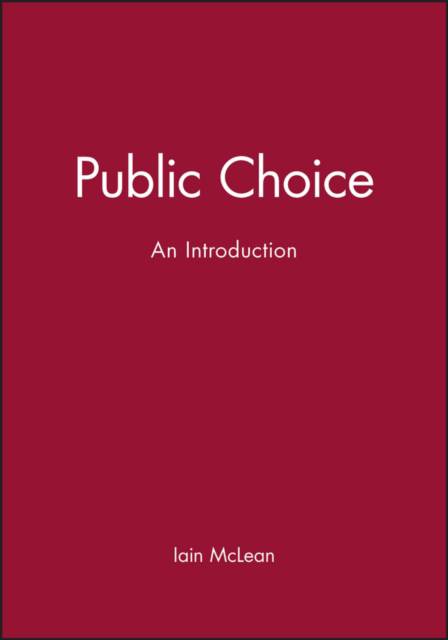
- Retrait gratuit dans votre magasin Club
- 7.000.000 titres dans notre catalogue
- Payer en toute sécurité
- Toujours un magasin près de chez vous
- Retrait gratuit dans votre magasin Club
- 7.000.0000 titres dans notre catalogue
- Payer en toute sécurité
- Toujours un magasin près de chez vous
Description
The 1968 Nobel Prize for Economics was awarded to one of the founders of public choice theory, James Buchanan, yet many people have only the vaguest idea what public choice is. The book offers and unusually clear and accessible introduction to an important subject. McLean examines the workings of public choice from two related perspectives - collective action and the aggregation of individual preferences into social consensus.
The book highlights the paradox at the heart of collective action- that self-interest in the public domain is frequently counterproductive. National defense and clean air are things we all benefit from - they are public goods - but we tend to resist contributing to them. The first part of this book examines how government choice in such areas is shaped, and by whom- political entrepreneurs, bureaucrats, interest groups and ordinary citizens. McLean uses the idea of a public market in which politicians sell what they hope voters will buy, and further considers how and when people (and animals) co-operate to produce public goods even without government coercion. In the second part of the book the author examines the consequences of combining individual preferences, arguing that there is no straightforward way of adding them up to form a 'social ordering' and assesing the implications of this both for electoral reform and for the status of 'the will of the people'.
The book highlights the paradox at the heart of collective action- that self-interest in the public domain is frequently counterproductive. National defense and clean air are things we all benefit from - they are public goods - but we tend to resist contributing to them. The first part of this book examines how government choice in such areas is shaped, and by whom- political entrepreneurs, bureaucrats, interest groups and ordinary citizens. McLean uses the idea of a public market in which politicians sell what they hope voters will buy, and further considers how and when people (and animals) co-operate to produce public goods even without government coercion. In the second part of the book the author examines the consequences of combining individual preferences, arguing that there is no straightforward way of adding them up to form a 'social ordering' and assesing the implications of this both for electoral reform and for the status of 'the will of the people'.
Spécifications
Parties prenantes
- Auteur(s) :
- Editeur:
Contenu
- Nombre de pages :
- 240
- Langue:
- Anglais
Caractéristiques
- EAN:
- 9780631138396
- Date de parution :
- 08-01-91
- Format:
- Livre broché
- Format numérique:
- Trade paperback (VS)
- Dimensions :
- 153 mm x 230 mm
- Poids :
- 390 g

Les avis
Nous publions uniquement les avis qui respectent les conditions requises. Consultez nos conditions pour les avis.






